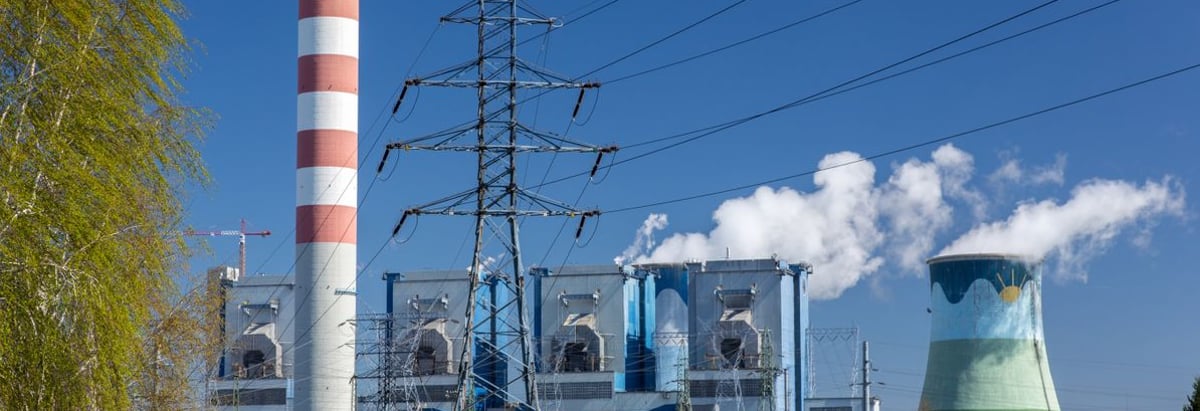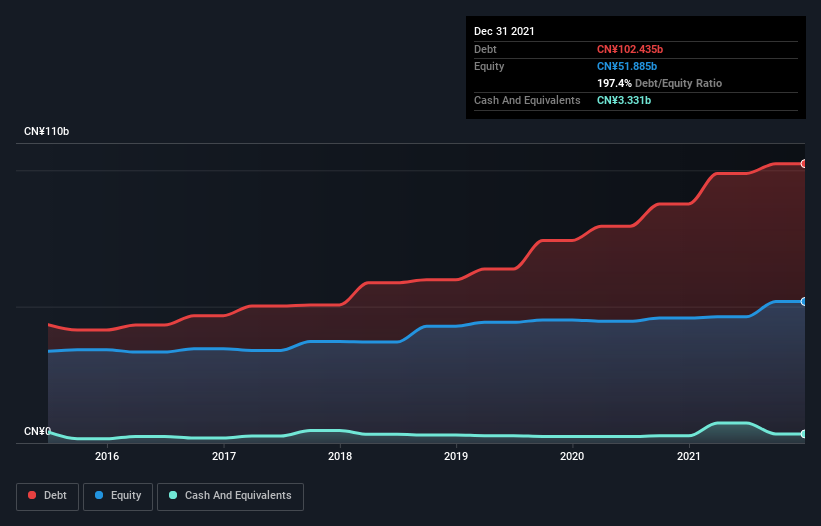- Hong Kong
- /
- Renewable Energy
- /
- SEHK:2380
Here's Why China Power International Development (HKG:2380) Is Weighed Down By Its Debt Load

Legendary fund manager Li Lu (who Charlie Munger backed) once said, 'The biggest investment risk is not the volatility of prices, but whether you will suffer a permanent loss of capital.' When we think about how risky a company is, we always like to look at its use of debt, since debt overload can lead to ruin. We note that China Power International Development Limited (HKG:2380) does have debt on its balance sheet. But the real question is whether this debt is making the company risky.
What Risk Does Debt Bring?
Debt assists a business until the business has trouble paying it off, either with new capital or with free cash flow. Ultimately, if the company can't fulfill its legal obligations to repay debt, shareholders could walk away with nothing. However, a more usual (but still expensive) situation is where a company must dilute shareholders at a cheap share price simply to get debt under control. Having said that, the most common situation is where a company manages its debt reasonably well - and to its own advantage. The first step when considering a company's debt levels is to consider its cash and debt together.
View our latest analysis for China Power International Development
What Is China Power International Development's Net Debt?
As you can see below, at the end of December 2021, China Power International Development had CN¥102.4b of debt, up from CN¥87.7b a year ago. Click the image for more detail. However, because it has a cash reserve of CN¥3.33b, its net debt is less, at about CN¥99.1b.

A Look At China Power International Development's Liabilities
Zooming in on the latest balance sheet data, we can see that China Power International Development had liabilities of CN¥45.5b due within 12 months and liabilities of CN¥77.3b due beyond that. On the other hand, it had cash of CN¥3.33b and CN¥11.0b worth of receivables due within a year. So its liabilities outweigh the sum of its cash and (near-term) receivables by CN¥108.5b.
This deficit casts a shadow over the CN¥35.9b company, like a colossus towering over mere mortals. So we definitely think shareholders need to watch this one closely. At the end of the day, China Power International Development would probably need a major re-capitalization if its creditors were to demand repayment.
We measure a company's debt load relative to its earnings power by looking at its net debt divided by its earnings before interest, tax, depreciation, and amortization (EBITDA) and by calculating how easily its earnings before interest and tax (EBIT) cover its interest expense (interest cover). This way, we consider both the absolute quantum of the debt, as well as the interest rates paid on it.
Weak interest cover of 1.2 times and a disturbingly high net debt to EBITDA ratio of 9.8 hit our confidence in China Power International Development like a one-two punch to the gut. This means we'd consider it to have a heavy debt load. Even worse, China Power International Development saw its EBIT tank 38% over the last 12 months. If earnings continue to follow that trajectory, paying off that debt load will be harder than convincing us to run a marathon in the rain. There's no doubt that we learn most about debt from the balance sheet. But it is future earnings, more than anything, that will determine China Power International Development's ability to maintain a healthy balance sheet going forward. So if you want to see what the professionals think, you might find this free report on analyst profit forecasts to be interesting.
Finally, while the tax-man may adore accounting profits, lenders only accept cold hard cash. So we always check how much of that EBIT is translated into free cash flow. During the last three years, China Power International Development burned a lot of cash. While that may be a result of expenditure for growth, it does make the debt far more risky.
Our View
To be frank both China Power International Development's EBIT growth rate and its track record of staying on top of its total liabilities make us rather uncomfortable with its debt levels. And even its interest cover fails to inspire much confidence. Considering everything we've mentioned above, it's fair to say that China Power International Development is carrying heavy debt load. If you harvest honey without a bee suit, you risk getting stung, so we'd probably stay away from this particular stock. When analysing debt levels, the balance sheet is the obvious place to start. However, not all investment risk resides within the balance sheet - far from it. Be aware that China Power International Development is showing 2 warning signs in our investment analysis , and 1 of those is a bit concerning...
Of course, if you're the type of investor who prefers buying stocks without the burden of debt, then don't hesitate to discover our exclusive list of net cash growth stocks, today.
New: AI Stock Screener & Alerts
Our new AI Stock Screener scans the market every day to uncover opportunities.
• Dividend Powerhouses (3%+ Yield)
• Undervalued Small Caps with Insider Buying
• High growth Tech and AI Companies
Or build your own from over 50 metrics.
Have feedback on this article? Concerned about the content? Get in touch with us directly. Alternatively, email editorial-team (at) simplywallst.com.
This article by Simply Wall St is general in nature. We provide commentary based on historical data and analyst forecasts only using an unbiased methodology and our articles are not intended to be financial advice. It does not constitute a recommendation to buy or sell any stock, and does not take account of your objectives, or your financial situation. We aim to bring you long-term focused analysis driven by fundamental data. Note that our analysis may not factor in the latest price-sensitive company announcements or qualitative material. Simply Wall St has no position in any stocks mentioned.
About SEHK:2380
China Power International Development
An investment holding company, develops, constructs, owns, operates, and manages power plants in the People’s Republic of China.
Undervalued with solid track record.
Market Insights
Community Narratives



